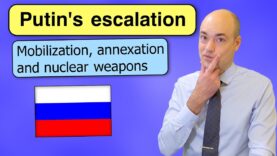Nord Stream sabotage and hybrid war on Europe
Video Summary
The sabotage of the Nord Stream gas pipelines has sparked many theories and speculations about who could be behind it. While there are no concrete evidence, the military theory suggests that the attack was designed to create uncertainty and to attribute the responsibility to multiple actors, making it a hybrid warfare tactic. The theory suggests that the operation was planned to occur between the detection and attribution thresholds, making it difficult to identify the perpetrator. This design creates three immediate effects: increased uncertainty on the European energy market, fear among countries involved, and divisions within the Western alliance supporting Ukraine. The author argues that only one actor, Russia, would benefit from this design and take the risk of destroying its own pipeline. The theory is supported by Prospect Theory, which states that people are more willing to take risks to avoid losing than to gain. As Russia is losing the war in Ukraine, it is more likely to take risks to turn the tide, while the US and Poland are not willing to take such risks given their current winning situation. The author concludes that the most likely perpetrator is Russia, and that the world should be prepared for more severe consequences.
























